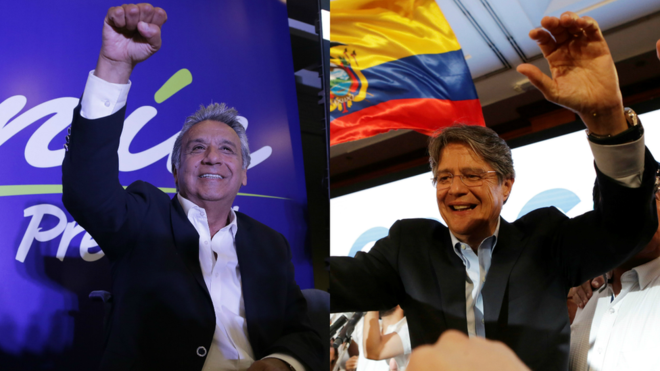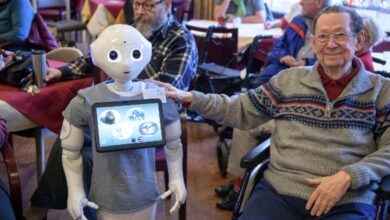Ecuador election: Moreno facing runoff as 40% vote looks out of reach


A runoff vote appears likely in Ecuador’s presidential election with Lenín Moreno appearing to fall just short of the 40% required for outright victory over his rightwing rival Guillermo Lasso.
With 87% of votes counted early on Monday morning, the national electoral council gave 39.09% to Moreno, who was a former vice-president under the outgoing Rafael Correa, and 28.28% to Lasso, a 61-year-old former banker. For an outright win a candidate needs 40% and a 10-point lead over his nearest rival.
The widely different results of two exit polls saw Moreno’s camp celebrating victory in the first round, while Lasso declared there would be a second round in which he would face the government’s candidate.
Moreno’s supporters draped in lime-green colours of the Alianza Pais coalition celebrated late IGNORE INTO the night to as live cumbia music blasted from a stage erected on a main avenue the headquarters in Quito.
At the close of voting, Moreno, flanked by Correa and the vice-president, Jorge Glas, told his rival to “lose with dignity” while he would “win with humility”.
A second round is not expected to favour 63-year-old Moreno, say analysts. They predict Ecuador’s opposition could join forces around Lasso, who has vehemently attacked the government, blaming it for an economic downturn and corruption scandals.
Fernando Tuesta, a political scientist at Lima’s Catholic University visiting Quito as an election observer, said the trend was unlikely to alter and it would be “very surprising” if Moreno’s votes got past the 40% needed for him to win outright.
“In a likely second round Lasso will face the challenge in bringing together all those people who didn’t vote for either one of them,” he added.
The two candidates offer very different visions of Ecuador’s future and its place in the world. Moreno represents the continuity of the nation’s leftwing government, with its focus on poverty reduction, disability rights and closer Latin American integration. But supporters say he represents a change of style, being more of a listener and less confrontational towards the media compared to his predecessor, Correa.
Lasso has vowed to cut taxes, boost employment, trim government spending and evict the founder of WikiLeaks, Julian Assange, from the Ecuadorian embassy in London. While Correa and Moreno have relied on Chinese loans and investment, Lasso is thought more likely to reach out to the US and the IMF.
On Sunday there were angry scenes when Lasso accompanied his running mate, Andrés Páez, to a polling station in the middle-class Rumipampa neighbourhood of Quito, which happened to be the same place where Moreno had to cast his ballot.
Surrounded by supporters chanting, “Lasso, please, save Ecuador,” the opposition candidate confidently told journalists the election would have a wider significance in Latin America where the “pink tide” could be reaching its low-water mark, because right-leaning leaders have taken over in Argentina, Brazil and Uruguay. “There will be a second round and in this round democracy and liberty will win, not just in Ecuador but also in Latin America,” he said.
By contrast Moreno, a former businessman who uses a wheelchair, cut a more placid figure as he cast his ballot surrounded by chanting supporters. “The elections are a democratic party which the people must enjoy because they are choosing the destiny they will meet in the future,” he said, choosing a more neutral tone than his rival.
Moreno, a former United Nations special envoy on disability, has used a wheelchair since he was shot in a robbery.
Outside the polling station, Anita Rueda, a Moreno supporter, said: “I’ve always supported this government with all my soul, because it’s the people’s movement which cares about the forgotten ones.”
Wheelchair user Angel Tobias Jerez had travelled especially to support Moreno. “Our comrade Lenín Moreno has won the hearts of all of us who have a disability,” he said. “Not just here but at an international level.”
Whether he can win the presidency is another matter in an election that analysts are viewing as a vote that will test the legacy of Correa, the self-declared leader of 21st-century socialism.
“Whichever candidate wins … they will face mounting debt, corruption allegations and demands from different sectors,” said Gabriel Hidalgo, a political scientist at Quito’s Americas University.





